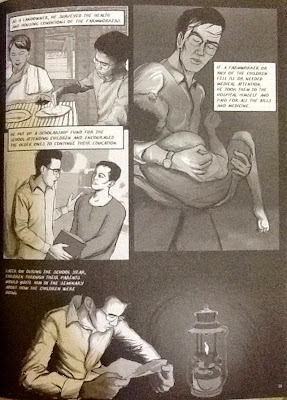"A cause greater than his life"
(A book review on "Luis Jalandoni: A Revolutionary"
and the man behind the said story)
By Lualhati Madlangawa Guererro
At first, this writeup is more than just a review, but also a tribute to a man whose faith in the church became a stepping stone to a series of contributions in the history of Filipino struggle, making him an inspiration to a generation willing to go beyond from the parameters of a decadent institution. And his name is Luis Jalandoni.
Known as the chief negotiator from the National Democratic Front, former Priest and perhaps even Theologian, LaSallian, and member of a prominent landowning family known for society circles long long ago. Mainstream media continues to describe him as a negotiator, if not an insurgent simply because of his commitment to the struggle that involves national and social awareness, and arduous commitments in pursuit of its profound ideals including those of armed struggle against the system.
Pardon this person if she had made his work radical for a review, given that his life is indeed radical. Prior to that book, she had read a biography of his, quite colorful indeed that somehow brought the attention of Ina Silverio, Enrico Maniago, Max Santiago, and others to create a story that is richly animated such as its drawings and mixed media. That somehow according to National Artist Bienvenido Lumbera, Jalandoni's illustrated life could leave a reader inspired, or as what he said, "stunned by the double impact of its edifying and insurgent message", while UP MassComm dean Rolando Tolentino stated that the book is a combination of "graphic novel and pop art" that "encourage more intellectuals and petibourgeois to rise to the challenge of bringing about class based and historic change".
Well indeed, people wanted that challenge, no matter the system tries to counter it with carrots and sticks or a fellow bourgeois threatening another with disconnections and insult. But the fact that in reading his illustrated life also shows how a bourgeois can become a proletarian in its conduct and committment, that serving the people is a highest form of charity people ought to consider with; and Realities such as poverty, injustice, and other serious matters affecting the society creates a consciousness that may likely to give up the privilege of everyday comforts, and instead willing to engage in a struggle in order to realise a greater idea that can benefit the common good.
That somehow Fr. Jalandoni did by expending his wealth and moral fervor to ease the plight of the people, and that is more than just doing charity nor any kind of community service system loves to treat it as a "confidence building measure", but like Fr. Gustavo Gutierrez, Ernesto Cardenal, and other theologians speaking about the importance of social and distributive justice, he would ask himself as well as others what are the root causes of that prevailing poverty and injustice, only to be replied by calling him subversive if not telling him to focus on just spiritual work.
But Christianity, or as what Christ and his Apostles envisioned, is more than just spiritual work as what most usually thinks of. Of what is "faith, hope, charity" if in actual being treated as a charade in a form of ritual and an impression of giving? People, particularly the poor, knows that these profit minded cliques, such as the Hacienderos, Compradores, as well as corrupt Bureaucrats are able to babble religious statements, be it from God, the Gospels, acting as repentants, doing charity to impress during holidays, yet in actual they failed to root out the cause of injustice as most of the working poor remained destitute, that they are suffering in malnutrition and low wages, worse, of having an actually existing unjust fear prevailing instead of love, regardless of how many times they attend mass nor confessions just to act like Pilates and Herods: washing hands trying to deny their actions, if not blaming the masses for being against the established view of the society, particularly those of unfairness and injustice.
And these two examples of such problems did made few amongst the privileged afforded to turn their backs on their comforts and engaging in struggle. In case of the stories behind that book, it was more than just idealism being realised, but also a test of courage that end passed in the eyes of many; that involves being shunned by some relatives and friends, being targeted for impunities laid by the order and its system controlled, of so-called "comrades" turning back in their once-called principles for privileges, and yet they afforded to survive amidst the hardships just to rekindle a faith that's being practised, as well as gaining respect from the people not in their respective homeland, but also in the world.
Anyways, few would understand what this person's saying in this post, and that man behind that featured comic book this person had bought remains a target of insult, rather than criticism, for being traitor to his class and to the society that's bereft of a true sense of faith and justice, thanks to that goddamn system.
But to those who able to capture the message, that person is a good example of a bourgeois who chose to go to the people. For sure that book can become a basis for a movie too in order for today's generation of masses to understand more about him and his unwavering deeds.




